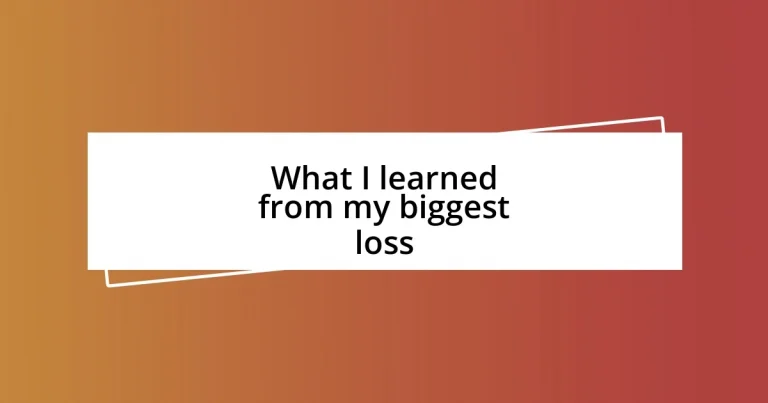Key takeaways:
- Personal loss serves as an awakening, prompting reevaluation of life choices and deepening connections with others.
- Key emotions experienced through loss—shock, anger, sadness, gratitude, and acceptance—provide valuable lessons that enhance emotional resilience and appreciation for life.
- Transforming loss into motivation can drive personal growth, urging individuals to reflect, innovate, and build supportive networks for future resilience.
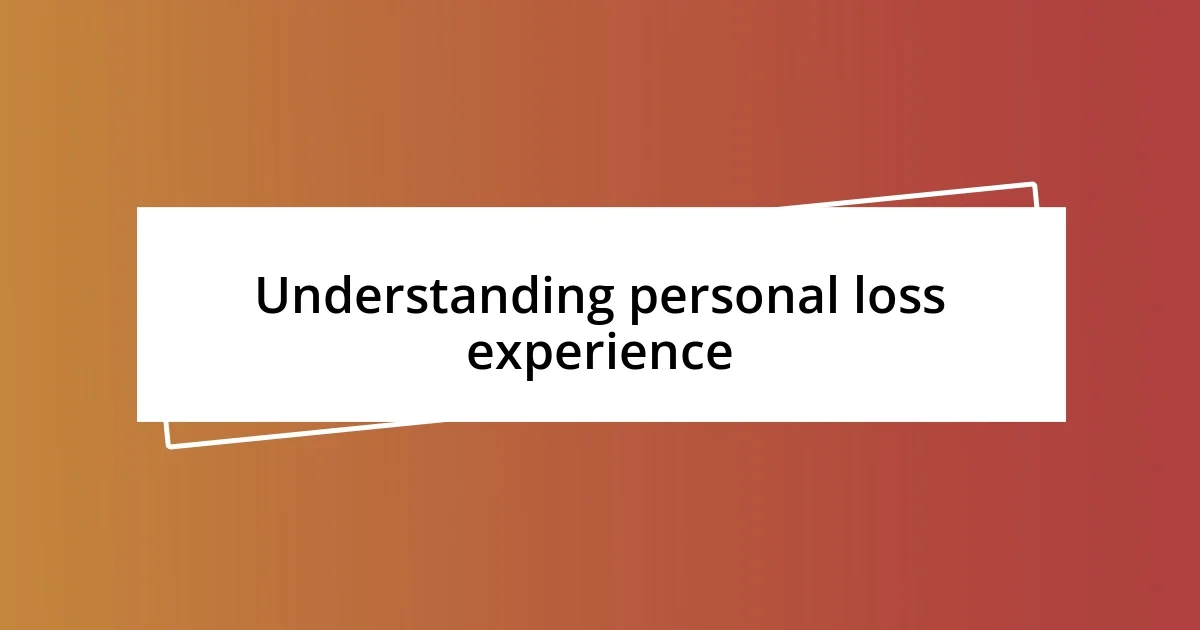
Understanding personal loss experience
Understanding personal loss is often a journey filled with complex emotions and reflections. I’ll never forget losing my childhood friend; it was a harsh wake-up call to the fragility of life. How does one truly process such devastating loss? It’s not easy, and sometimes just grappling with the anger and sadness takes time.
As I navigated my way through grief, I found myself questioning everything—my beliefs, my values, even the purpose of relationships. It made me realize that loss pushes us to confront our vulnerabilities. Has a loss ever made you reevaluate your life choices? For me, the answer was a resounding yes; it ignited a deep desire for connection and authenticity.
In those quiet moments of reflection, I learned that personal loss isn’t just about the absence of someone; it can also be an awakening. I remember sitting alone, just staring at old photographs, feeling a mix of nostalgia and grief. It made me appreciate the fleeting moments we sometimes take for granted. What lessons do you think loss teaches us about living fully? I believe it teaches us to cherish every interaction and to be present, as life can change in an instant.
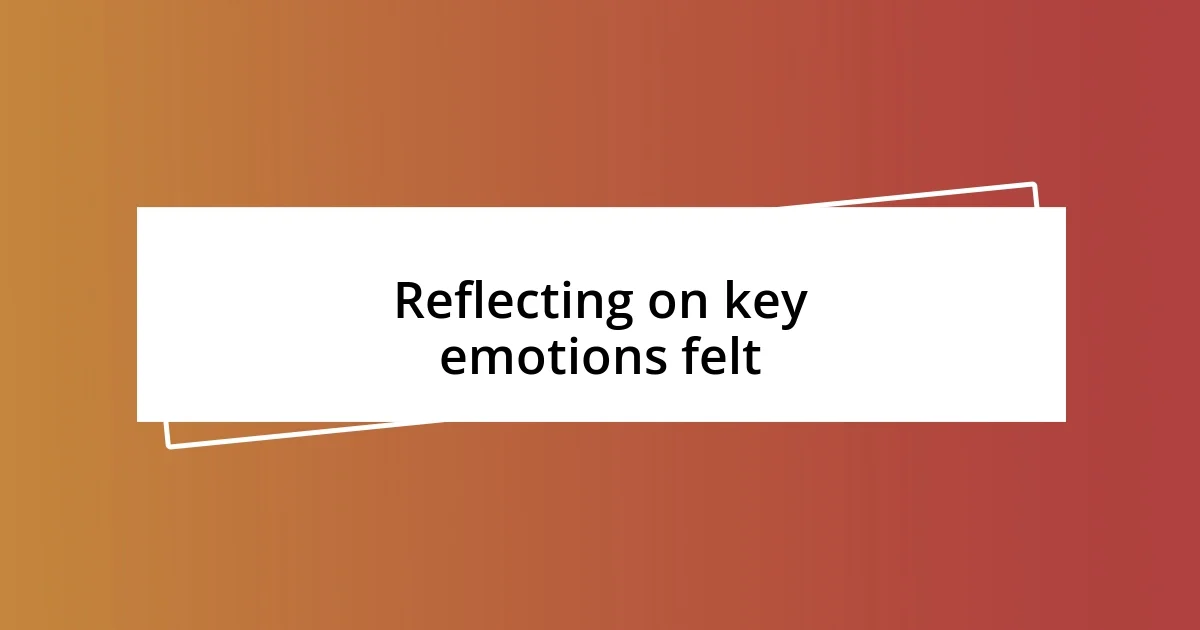
Reflecting on key emotions felt
Reflecting on the emotions I felt in the wake of my loss was like peeling back the layers of an onion. Each layer revealed a different feeling—shock, anger, and ultimately, acceptance. I remember sitting in the family living room, staring at the empty chair where my friend used to sit, and I felt an overwhelming wave of loneliness wash over me. It was a profound reminder of how deeply interwoven our lives become with those we love.
- Shock: Initially, everything felt surreal. I couldn’t comprehend the finality of loss.
- Anger: I often found myself angry—not just at the situation, but at the world for continuing on as if nothing had changed.
- Sadness: A heavy sadness settled in, resembling a fog that lingered even on sunny days.
- Gratitude: Amidst the pain, I began to feel grateful for the moments we shared, making me appreciate memories I once took for granted.
- Acceptance: Eventually, I learned to embrace acceptance, realizing that while loss is painful, it teaches us to hold memories close and love deeper.
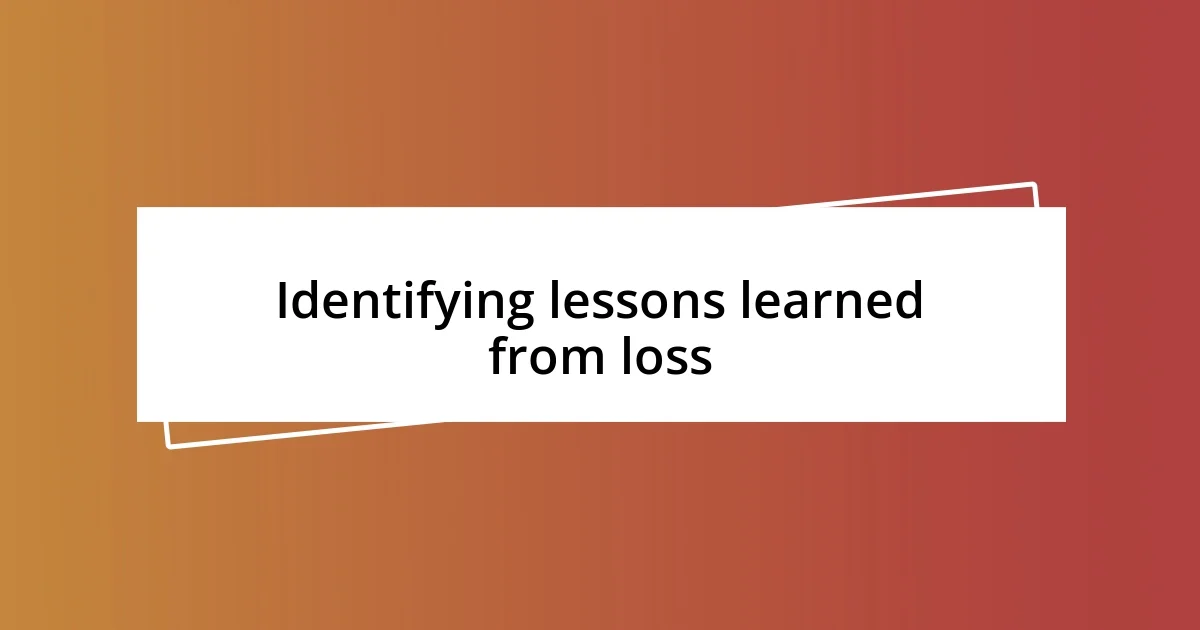
Identifying lessons learned from loss
Identifying lessons from loss has been one of the most profound experiences of my life. I remember vividly the moment I realized that every setback held a lesson. After losing my job unexpectedly, I felt shattered. However, that experience pushed me to explore my passions and ultimately led me to a career path I never imagined. Have you ever found an unexpected silver lining in a tough situation? For me, it was this awakening that taught me resilience and the importance of adaptability.
Loss often unveils hidden strengths we didn’t know we possessed. Reflecting on my journey, I found that coping with grief built my emotional resilience. When I lost my grandmother, I began to realize that my role in the family could shift from simply receiving support to providing it. It’s fascinating how life’s toughest moments can drive personal growth. This experience enriched my understanding of empathy and compassion, reminding me that we’re all interconnected.
In the end, the lessons from loss create a deeper appreciation for life. It’s like being handed a new lens through which to view the world. Each loss teaches us something unique; for me, it was learning to live fully in the present. How about you? What lessons have you extracted from your struggles? Reflecting on these moments can often illuminate what truly matters in our lives.
| Emotion | Lesson Learned |
|---|---|
| Shock | Helps to appreciate life’s transience |
| Anger | Encourages self-advocacy and change |
| Sadness | Promotes emotional depth and connection |
| Gratitude | Highlights the importance of cherished memories |
| Acceptance | Teaches the value of moving forward |
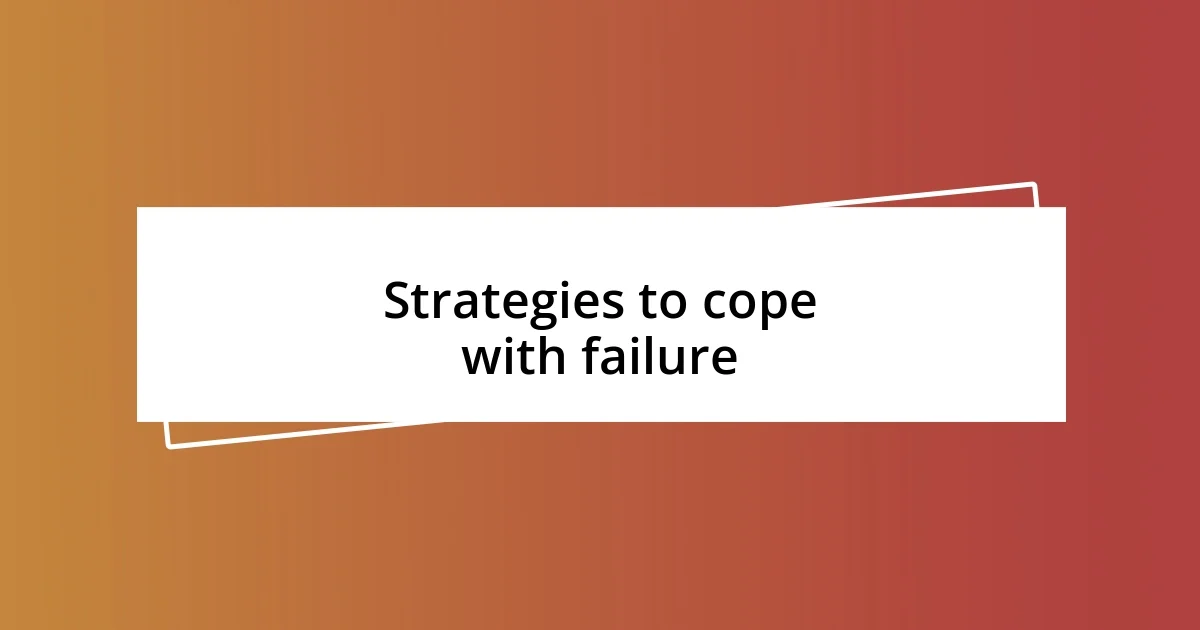
Strategies to cope with failure
Finding effective strategies to cope with failure can truly transform how we handle loss. One method I found incredibly helpful was journaling. Writing down my feelings helped me analyze and understand them better. It was like having a heart-to-heart with myself. Have you ever experienced the catharsis of putting pen to paper? For me, this practice opened doors to a clearer mind and healing heart.
Another strategy that made a significant difference was seeking support from others. I remember reaching out to friends after a tough breakup. Their willingness to listen and share their own struggles made me realize I wasn’t alone. Connecting with others who have faced similar challenges can remind us that sharing our burdens lightens the load. Have you ever found solace in someone else’s story? It can be incredibly validating to feel understood.
Lastly, I discovered that cultivating a growth mindset was essential. Viewing setbacks as opportunities for growth changed my perspective. When I failed to secure a project I was passionate about, I took the time to evaluate what went wrong and what I could do differently next time. Shifting my mindset this way opened up new possibilities I had never considered before. It’s interesting how failure can often act as a stepping stone rather than a stumbling block, don’t you think? Embracing this approach can lead to unexpected avenues of success.
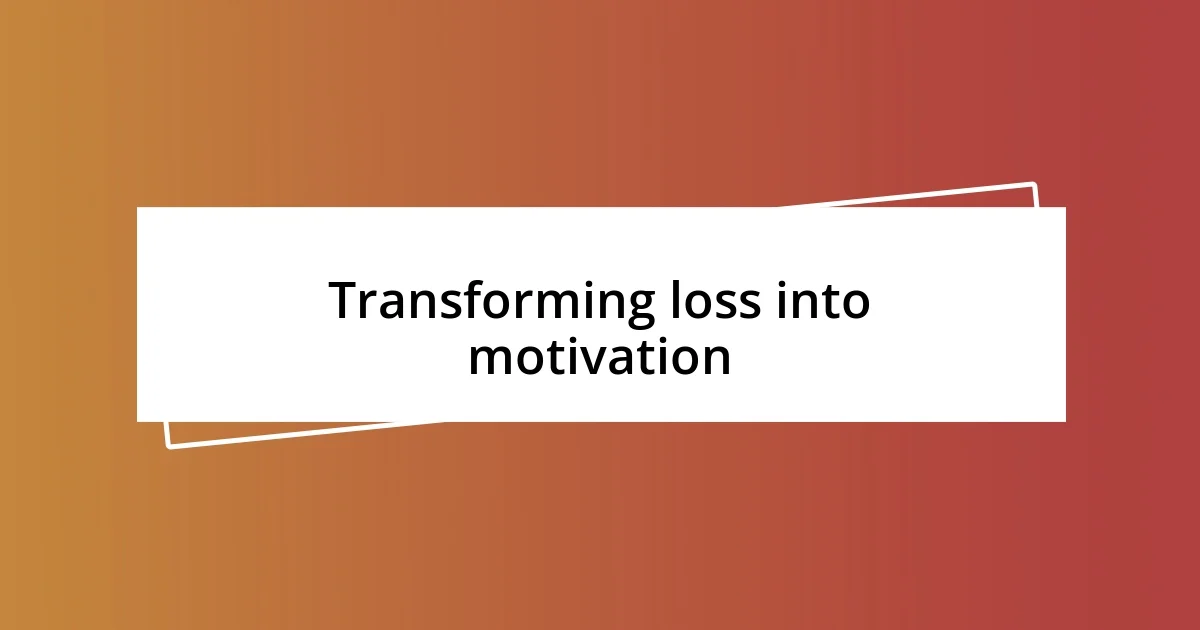
Transforming loss into motivation
Transforming loss into motivation has been a crucial step in my personal growth. I remember a time when I lost a significant competition. The initial sting of defeat felt unbearable, but it stirred something deep within me—a desire to prove myself. That motivation pushed me to train harder, adapt my strategies, and ultimately led to a comeback that not only boosted my confidence but also rekindled my passion for the sport. Have you ever channeled your disappointment into determination? I found that loss can ignite the fire for improvement we didn’t know we had.
While navigating life’s challenges, I’ve discovered that grief can serve as a profound catalyst for change. After a close friend moved away, I realized how much I valued our time together. Instead of wallowing in sadness, I took it upon myself to forge new friendships and reach out to others in my community. That push to expand my social circle not only filled the void left by my friend but also taught me the importance of connection. Isn’t it interesting how loss can reshape our priorities? In this way, those moments of heartache transformed into opportunities for growth.
Through these experiences, I’ve learned that embracing loss can foster immense motivation. When I lost a major client at work, instead of spiraling into despair, I took it as a moment to reflect and innovate. I re-evaluated my approach, sought additional training, and diversified my portfolio. That proactive mindset didn’t just help me recover; it led to even larger projects down the road. Isn’t it remarkable how resilience can pave the way for new opportunities? Turning loss into motivation has fundamentally altered my path, reminding me that each setback can indeed be a stepping stone for greater achievements.
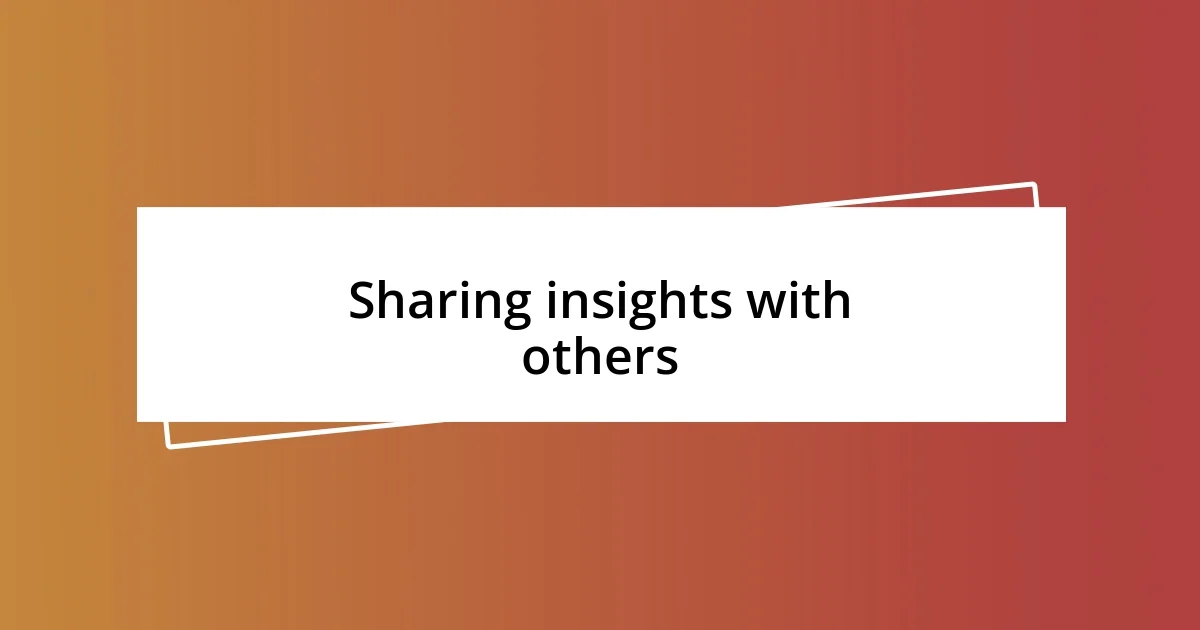
Sharing insights with others
Sharing insights with others often feels like a bridge to connection and understanding. I remember a particularly tough period in my life when I lost a significant job opportunity I had set my heart on. Instead of keeping my experience bottled up, I decided to chat with a mentor who had faced similar setbacks. Their stories not only validated my feelings but also equipped me with tools to approach future challenges differently. Have you ever had a conversation that lifted a weight off your shoulders?
In the aftermath of my loss, I discovered the power of storytelling. I began sharing my journey with friends, and it was fascinating to see how my vulnerability encouraged others to open up about their experiences. One friend’s story about their own failures made me realize that we’re all navigating this crazy journey together. Isn’t it amazing how sharing can transform isolation into camaraderie? It’s like finding a warm light in a dark place, reminding us that we’re stronger when we come together.
Every conversation I had after that loss became an opportunity for growth—not just for me but for everyone involved. I vividly remember sitting in a group workshop where participants shared their struggles and triumphs. The room buzzed with energy as we all learned from each other’s insights. Each nugget of wisdom felt like a gift. This experience reinforced my belief that shared insights can create ripples of understanding that extend far beyond our individual stories. How have shared insights helped you navigate tough times? For me, they’ve become a vital thread in the fabric of resilience.
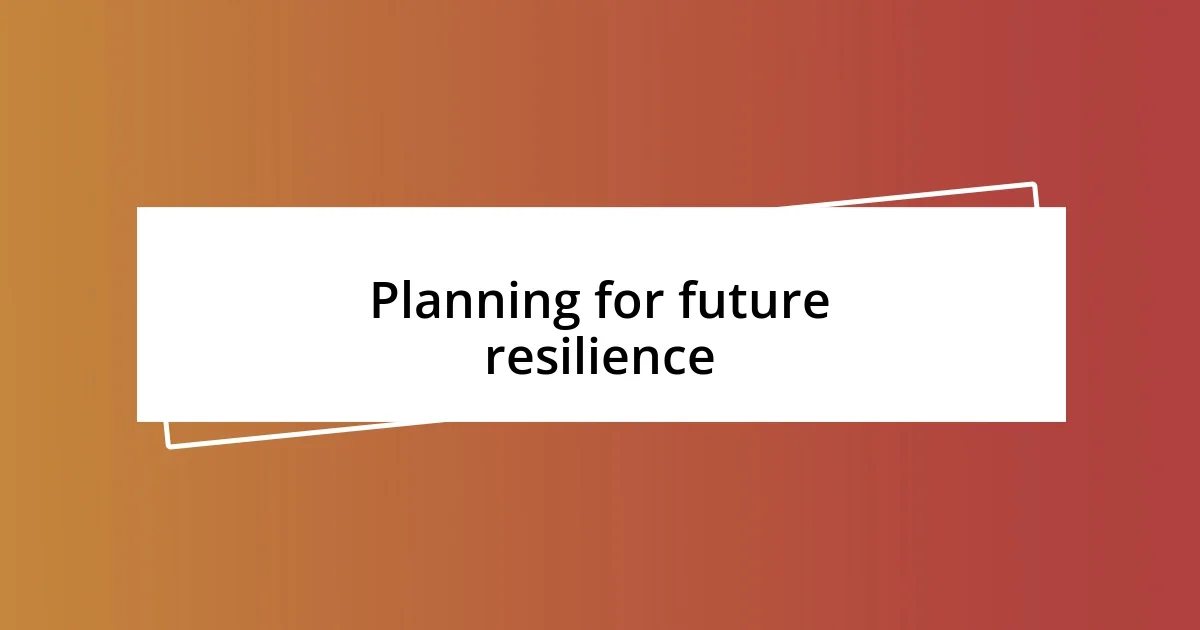
Planning for future resilience
Planning for future resilience requires a proactive mindset that embraces preparation. A few years ago, I faced a crushing setback when a project I had poured my heart into fell through at the last moment. Instead of letting that dishearten me, I realized I needed an actionable plan moving forward. I created a detailed roadmap that outlined potential risks and alternatives for future endeavors. Have you ever identified risks before stepping into a new venture? It’s empowering to have strategies in place that can help you adapt when the unexpected happens.
Setting up a support network is another key aspect of resilience planning. After my experience with loss, I made it a priority to connect with like-minded individuals who could provide guidance and encouragement. I remember attending a local networking event and sharing my story with others who had faced similar tribulations. The connections I built not only expanded my resource pool but also created a safety net for future challenges. Isn’t it inspiring how a solid support system can boost our confidence and provide fresh perspectives?
Finally, I’ve found that reflecting on my past experiences is invaluable for maintaining resilience. After I lost a key partnership, I took time to journal about what went wrong and what I could learn from it. This practice helped me to pinpoint gaps in my approach and recognize patterns that I needed to avoid in the future. Have you ever taken a step back to evaluate your experiences? Diving deep into reflection transforms mistakes into lessons, shaping our resilience for whatever comes next. Each moment of introspection I engage in feels like a stepping stone, guiding me toward a more prepared and adaptable future.












